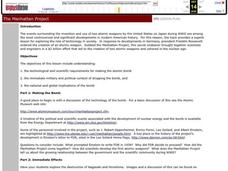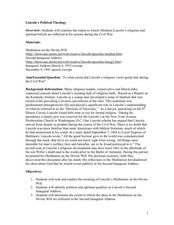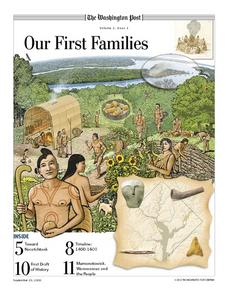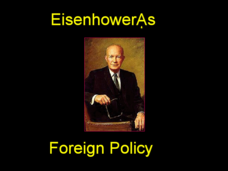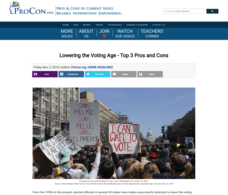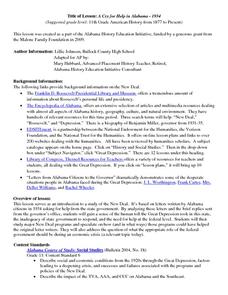Scholastic
The Rise of Railroads: California
Railways are an integral part of the history of California. Using a timeline format, class members connect major historical events to the rise of the railroads and their impact on the state. Activities include a mix of independent and...
Curated OER
Understanding the Declaration of Independence
Learners work in groups to do a document analyxix of several documents. Students view the Martin Luther King speech, "I Have a Dream." They discuss the Battle of Saratoge. Learners give a personal view of the reason the Declaration of...
Curated OER
United States Entry into World War I: Some Hypotheses About U.S. Entry
Pupils determine the most compelling evidence explaining why the U.S. entered WWI. They read and discuss a handout of reasons why the U.S. entered the war, and take a poll as to which reason was the most compelling.
Curated OER
Police Action: The Korean War, 1950-1953
Students explore why the United States became involved in the war in Korea. They discuss the confict between Truman and MacArthur, culminating in the latter's dismissal from command. They identify on a world map foreign countires...
Curated OER
The Manhattan Project
Students discover the technological and scientific requirements for making the atomic bomb, the immediate effects of an atomic bomb, and the social and political changes that have resulted from the Manhattan Project.
Curated OER
Lincoln’s Political Theology
Students consider the weight of Lincoln's spiritual life on his political life. In this Abraham Lincoln lesson, students read excerpts from speeches delivered by Lincoln and determine whether they reveal information about Lincoln's...
Curated OER
George Washington: The Living Symbol
Students discuss George Washington's life and how he became a symbol of this nation. They categorize various images of Washington into the various roles he plays.
Curated OER
Who Gets the Job?
Pupils explore the process for presedential Cabinet appointments. They determine common characteristics found in members of the Cabinet.
Curated OER
Our First Families
Students complete a variety of activities in which the Washington Post Newspaper is used to reinforce concepts pertaining to the history of the Washington, D.C. area.
Curated OER
Abraham Lincoln and the Arts
Students engage in a study of history and how the figure of Abraham Lincoln has evolved into a national cultural icon. They discuss the importance of his life and how he influenced the political landscape of America in the past and present.
Curated OER
What Can You Find in the Cabinet?
Looking in the cabinet can be fascinating! Examine the various departments of the Executive Cabinet in this group research project, which jigsaws so each small group has a different department and presents to the class. Groups create...
Curated OER
Creating the Constitution
Useful as a review assignment or as a quiz, these ten questions on the U.S. Constitution address its creation. Thomas Jefferson, John Adams, and Ben Franklin are the main topics of the questions, as well as The Three-Fifths Compromise.
Curated OER
Eisenhower's Foreign Policy
Good for setting the context for 20th century foreign policy issues, these slides describe key points in Latin America, the Middle East, the Far East, and Europe. US or World History classes will appreciate the concise list on each...
John F. Kennedy Presidential Library & Museum
Ask Not What Your Country Can Do for You
Ask not what the instructional activity here can do for you, but what you can do with the instructional activity. The answer is quite a lot! Young scholars revisit JFK's famous inaugural address with a focus on his plea for civic...
National Endowment for the Humanities
The "To Do List" of the Continental Congress
What is on your to-do list today? The second lesson of a three-part series on Lost Heroes of America investigates the laundry list of items in front of the second Continental Congress. Scholars research, analyze, and present information...
Lessons on American Presidents
Abraham Lincoln
Honor Abe Lincoln with a set of activity-based worksheets that can be used independently and in collaborative groups. Young historians participate in a listening activity where they fill in the missing blanks in a passage while being...
National Endowment for the Humanities
How "Grand" and "Allied" Was the Grand Alliance?
Learn more about the Grand Alliance with a scaffolded lesson plan that includes four activities. Class members use primary sources to complete a map exercise, understand the goals and objectives of each individual nation, and participate...
Humanities Texas
Primary Source Worksheet: Text of “Prouder, Stronger, Better"
Political ads as primary source documents? But of course. Viewers analyze the strategies involved in the Republican Party's 1984 advertisement in support of Ronald Reagan's reelection.
Deliberating in a Democracy
Preventive War
"Those who knocked these buildings down will hear from all of us soon!" - George W. Bush. Scholars investigate and analyze the events of September 11, 2001 in ushering in the Bush Doctrine on foreign policy. Using primary documents as...
ProCon
Voting Age
Should age matter when it comes to voting? Scholars read an article discussing the pros and cons of lowering the voting age to 16. They then consider both the advantages and disadvantages of having younger voters. After thinking about...
K20 Learn
(Mis)Reported and (Mis)Remembered: The Vietnam War
New ReviewWhat are the complicated legacies of the Vietnam War? Learners consider the question as they examine videos and primary sources from the conflict. After examining footage and documents such as the Gulf of Tonkin Resolution and an op-ed...
DocsTeach
Court Packing vs. Reorganizing: The Supreme Court in the New Deal
Travel back in time to understand the effects of FDR's New Deal on the Supreme Court. Academics analyze historical documents to understand FDR's attempts to pack the Supreme Court and the opposition he faced. The activity includes a...
DocsTeach
Letter to Truman about the Manhattan Project
Delve into the past to understand the opposition to the Manhattan Project. An interesting activity is designed to be completed in pairs, groups, or individually. Scholars analyze historical documents, complete an online worksheet, and...
Alabama Department of Archives and History
A Cry for Help in Alabama - 1934
What should be the role of the federal government during an economic crisis? That is the question at the center of this introduction to a study of the New Deal. Class members examine letters to the state government asking for help,...
Other popular searches
- Famous American Presidents
- American Presidents Report
- First American Presidents
- List American Presidents
- Recent American Presidents
- American Presidents Order
- Frost American Presidents
- American Presidents Puzzles
- Frist American Presidents
- American President Movie
- The American President
- The American President Movie






